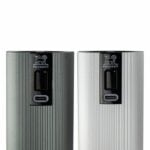Stellantis will build a large commercial van for Toyota in its factories in Poland and Italy starting in mid-2024, including a fully electric version.
The collaboration will give Toyota a big van to sell in Europe for the first time.
Stellantis currently produces compact and medium-sized trucks for Toyota, both in the commercial version and in the passenger version. No name has been announced for the new van, but the Toyota compact van is called the Proace City, and the medium-sized van is the Proace.
Proace has been built at the Stellantis plant in Hordain, France, since 2012, and in the city of Proace in Vigo, Spain, since 2019.
The new model will be built at the Stellantis Sevel plant in Atessa, Italy, and Gliwice, Poland. The move will give Stellantis five brands on common van platforms: Citroen, Fiat, Opel, Peugeot, Toyota and Vauxhall.
The big Toyota van will join the Citroen Jumper, Fiat Ducato, Opel / Vauxhall Movano and Peugeot Boxer. Stellantis sells vans in diesel and fully electric versions.
Stellantis’ share of the European vans market became a problem before the merger between Fiat Chrysler and PSA Group, which created the new group in January 2021. The EU competition authority decided in December 2020 that PSA should extend its agreement with Toyota by increasing capacity for Toyota and reducing transfer prices for vehicles, spare parts and accessories.
Stellantis continues to grow
The EU was concerned that FCA and PSA would dominate the European car market with a combined share of 34%, well ahead of Renault and Ford, each with a 16% share, Volkswagen with 12% and Daimler with 10%. This dominant position could mean higher prices for customers, the Commission said.
“This agreement strengthens our leadership in EU30 for commercial vehicles and low-emission vehicles and brings us one step closer to achieving our Dare Forward 2030 goal of becoming the undisputed leader in global light commercial vehicles in terms of technology, production “Market share and profitability,” said Stellantis CEO Carlos Tavares.
Stellantis has also set up a separate commercial unit for light commercial vehicles, which Taveres said will have more freedom to develop new technologies, such as hydrogen fuel cell powertrains.
The light commercial vehicle market remained relatively strong in Europe, largely due to demand for online sales and deliveries. According to the ACEA industry group, truck sales of 3.5 tonnes and less increased by 10.5% in 2021 in the EU, the UK and EFTA countries to 1,981,412 units. At the same time, car sales fell by 1.5% in 2021.
Toyota Europe President Matthew Harrison said the big van “is an important plus and complements our light commercial range for European Toyota customers. The new LCV will be a key contribution to Toyota’s growth goals for its overall LCV range. “

 Renault’s compact family SUV will be called the Symbioz -.
Renault’s compact family SUV will be called the Symbioz -. Peugeot and its new range of salt and pepper mills -.
Peugeot and its new range of salt and pepper mills -. A new Uber Eats ad is being criticized for showing a peanut allergy -.
A new Uber Eats ad is being criticized for showing a peanut allergy -. Pagani announces new track-based hypercar, known as the Huayra R Evo -.
Pagani announces new track-based hypercar, known as the Huayra R Evo -. Introducing the Oscars in the Best Casting category -.
Introducing the Oscars in the Best Casting category -.